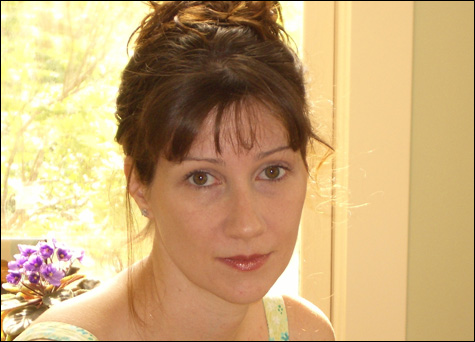
DRAWING ON OTHER PEOPLE’S LIVES: Gruen. |
Each of Sara Gruen’s first three novels have had animal characters who were crucial to the book, but it is Water for Elephants that has made the biggest splash. From initial rejections by many publishers (it ended up with Algonquin Books) to its 2006 hardcover success (12 weeks on the New York Times list), its zoom to the top of the Times paperbacks last summer, and its pick for this year’s Reading Across Rhode Island, Water for Elephants has had a broad and ever-increasing readership. The RI Center for the Book at Providence Public Library sponsors its sixth annual May Breakfast with Gruen as guest speaker, May 10 at Rhodes-On-the-Pawtuxet (readingacrossri.org).
“It continues to surprise and delight me that people connect with the characters and the circumstances of the book,” Gruen noted, in a recent phone conversation from her home in western North Caro-lina. “People are really passionate about some of the characters, and they get really mad at me for having killed some of them. People also get mad at me for the animal abuse, and I have to remind them that this is a fictional elephant — no elephants were harmed during the writing of this book.”

Water for Elephants is the saga of a 23-year-old veterinary student, Jacob Jankowski, who lands on a traveling circus train in 1931. The three-and-a-half months that he spends with the Benzini Brothers Most Spectacular Show on Earth are indelibly fixed in his memory and recalled in vivid detail through the daydreams of his 93-year-old self, confined to a nursing home. Jacob encounters a raft of colorful char-acters at this second-rate circus, including the dwarf clown Walter and his dog Queenie; an alcoholic old man, Camel, suffering from Jamaican ginger extract poisoning (“jake leg”); the conniving ringmas-ter/owner Uncle Al; the mercurial menagerie director August; his beautiful and alluring wife Marlena; and Rosie, the elephant who is the catalyst for much of the plot.
Gruen, a former technical writer, came to the States from her native Ontario in 1999, settling with her husband and three children north of Chicago for several years. After the financial success (and film option) of Elephants, and a multi-million-dollar advance from Spiegel & Grau for Ape House, due out in October, Gruen moved her family and her own menagerie (horses, cats, dog, goat) to a warmer clime.
Gruen grew up with one cat, one dog, and a deal with her parents to keep playing violin in exchange for riding lessons. And although her other two novels prominently feature horses, she maintains that she does not write about things from her own life, though she does use elements from other people’s lives.
She was inspired to write Water for Elephants because of a newspaper article about the circus photographer Edward J. Kelty. That led her to do months of research at circus archives, including those in Sarasota, Florida, and Baraboo, Wisconsin, plus interviews with former circus employees, and close encounters with two elephants. She wove in stories that she found about those small circuses and particularly about the elephants.
As for the nursing home sections of the novel, Gruen declares that she’s never been in one: “That age and that voice came to me basically from lying awake at 3:30 in the morning, imagining myself getting older and all the fears that come up around that.”
Partway through the writing of Elephants, Gruen had “a terrible writer’s block” and moved her writing desk into a closet to minimize distractions.
“On a smaller scale, what was hard about it was that I had to kill a couple of characters that I really loved,” Gruen remembered. “It took me a couple of days to work up to doing that. I had emotional seepage from fictional world to real world, and I was very grumpy.”
For the new novel, Gruen had “two-way conversations” with two bonobos at the Great Ape Trust in Iowa. Though the bonobos there use a lexigram board to communicate, she has her fictional bonobos using American Sign
Language.
“I am having a go at the tabloid culture and the reality TV culture, and my apes end up in a reality TV show called Ape House,” Gruen explained. “And the fun ensues.”